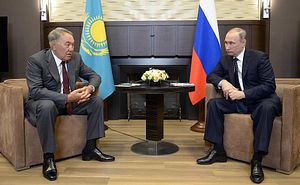Having helped patch up affairs between Russia and Turkey, Kazakhstan’s President Nursultan Nazarbayev is returning his attentions to Ukraine.
With the Ukraine crisis well into its third year and considerable recent speculation that it could be on the verge of a new phase, Nazarbayev has continued to position himself as a bridge between Moscow and Kyiv. Riding on his success bringing Russia and Turkey back into alignment, Nazarbayev seems intent to repeat his role as a mediator.
In a recent meeting with Russian President Vladimir Putin in the Black Sea city of Sochi, Nazarbayev lauded the recent Russia-Turkey rapprochement. “I am pleased that Russia’s relations with Turkey are improving,” he said. Giving a slight nod to trade difficulties exacerbated by sanctions, Nazarbayev noted that there are “diverging views and perspectives on sanctions in Europe.” Trade between Ukraine and Kazakhstan has become more complicated following a Russian decree that all trade bound for the Central Asian region from Ukraine and transiting Russian territory would have to first pass through Belarus. Falling trade volumes between Kazakhstan and Ukraine, as well as Kazakhstan and Russia, are in part a product of the overall regional economic downturn, but sanctions and politics aren’t helping.
Still, Nazarbayev found ray of sunshine for the Kazakh-Russian bilateral: “For example, trade between Kazakhstan and Russia is on the rise because some products are no longer available from the West.” Without hard numbers it’s difficult to verify that claim at present but Kazakh imports of goods from Russia fell from a high of $17.9 billion in 2013 to $13.8 billion in 2014 (the most recent numbers available from Comtrade).
Moving more fully into the issue of Ukraine, Nazarbayev recounted a recent phone call from Ukrainian President Petro Poroshenko:
Mr. Poroshenko telephoned me recently. He cannot approve the status of Donbass and the second region there, because he does not have a parliamentary majority. On the other hand, there are other matters that could be resolved; I believe he is actually willing to compromise, but for some reason a compromise has not yet been found.
All these issues are certainly a burden for Russia, but they can be resolved. Crises come and go. Kazakhstani-Russian relations remain stable…
Putin’s reply focused solely on the mention of repairing Turkey-Russian relations. “In this connection, I would like to thank you for your mediation,” Putin said. “I would like to thank you very much for this.”
“I was only trying to help,” Nazarbayev replied. He noted that the Russia-Turkey relationship has an impact on Kazakhstan given the country’s ties with Turkey, but that “We strongly adhered to Russia’s position in the conflict.” Nazarbayev went on to say, “at the same time, if my help was useful, I believe that it was a good thing” and that he is “ready to continue along these lines.”
Nazarbayev has long sought to position Kazakhstan as an international power, a mediator and a country that is friends with all others. To an extent, he has been successful. Astana is indeed well placed to act as a go-between for Moscow. The Ukraine crisis, however, has not proven an easy puzzle to solve. Nazarbayev, who in the past has shuttled between meetings with Ukrainian delegations and Russian delegations in rapid succession, remains a middleman in their dispute. Astana has serious interests in seeing the conflict deescalated, but may not have the leverage to make it happen. The sudden rapprochement between Turkey and Russia was helped along, in part, by the nearly simultaneous coup attempt.
This isn’t to dispute the importance of Kazakhstan in mediating the improvement of relations–something that has been lauded by both Russia and Turkey in spades–but to note other contributing factors. The Ukraine crisis is more complex, has more interested parties with their own interests at play, and has been going on for far longer than the Turkey-Russia spat.
Here’s hoping Nazarbayev is up to the challenge.
































